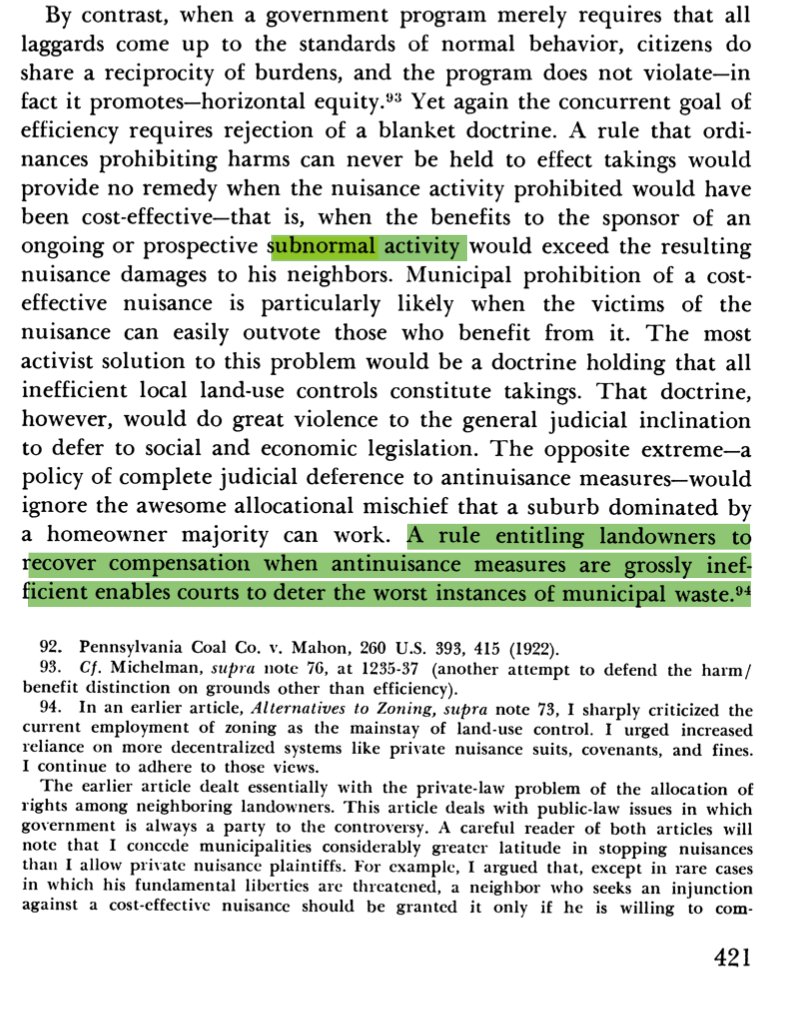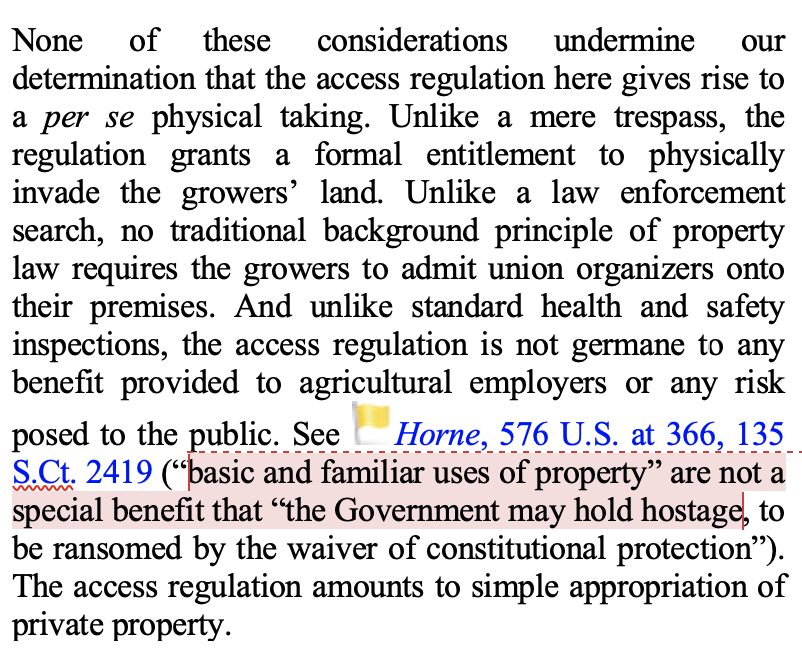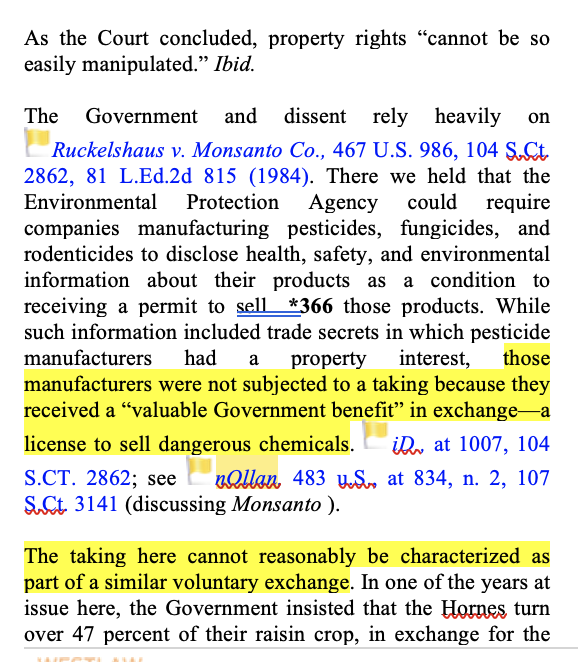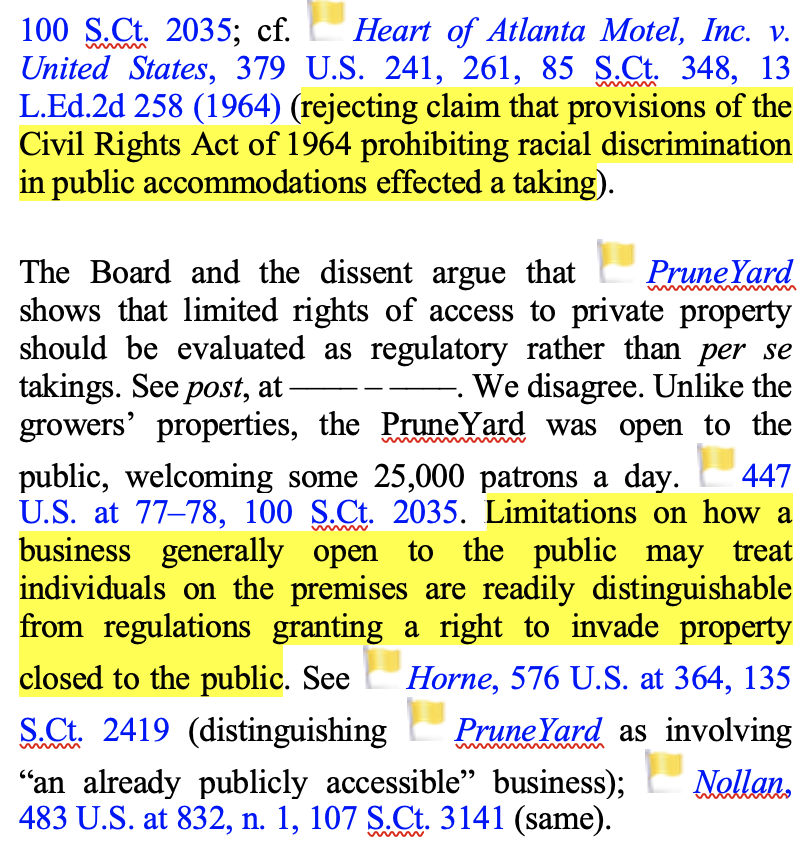
Is John Roberts channeling his inner Bob Ellickson?
A thread on the Cedar Point Nursery takings case, w/ implications for urban land use and rent control laws.
1/n
supremecourt.gov/opinions/20pdf…
A thread on the Cedar Point Nursery takings case, w/ implications for urban land use and rent control laws.
1/n
supremecourt.gov/opinions/20pdf…
Supreme Court per Roberts held that California farm-labor law, which gives union organizers a right of access to private farms, effects an unconstitutional taking of farmer's property right to exclude others. 2/n
Answering the parade of horribles--doesn't his theory invalidate all manner of health / safety inspection laws & antidiscrimination laws, unless gov't pays compensation for infringing "right to exclude"--Roberts intimates that those are different b/c owner consents. 3/n
The shopping mall owner has no cause to complain about civil rights or even "right to leaflet" laws, b/c owner has voluntarily opened the mall to the public, in effect consenting to the state's limitation on exclusion. 4/n 

The factory operator has no cause to complain about ordinary health / safety inspections, or even requirement that they disclose trade secrets (Ruckelshaus v. Monsanto), b/c they voluntarily applied for permit to engage in risky business. 5/n 

Yet lest California try to outfox court w/ new "farming-by-permit" regime (w/ condition of permit being right of access for organizers), Roberts says state may not condition "basic and familiar uses of property" on waiver of right to exclude. 6/n

https://twitter.com/mollyxbrady/status/1407724467615371264

He grounds this proposition on his own opinion in Horne v. USDA (2015), which held that regulation requiring raisin growers to give portion of crop to gov't board as condition to sell rest of crop in interstate commerce was a taking, b/c involuntary. 7/n 

His voluntary / involuntary distinction needs a theory of entitlements to be operationalized, and this is where Roberts seems to channel Ellickson. 8/n
Back in 1970s, Ellickson wrote that when gov't regulates "subnormal" land uses, courts should find taking only if regulation is grossly inefficient, whereas when gov't requires supranormal land use, courts should ordinarily make govt pay compensation or remove regulation. 9/n 





The same idea lies at root of Horne / Cedar Point distinctions between "license to sell dangerous chemicals" (subnormal use of property) and farming, selling fruit in interstate commerce, or expanding one's home (normal uses). 10/n 





The main difference between Roberts and Ellickson is that Ellickson's theory would govern all restrictions on *owner's use* of property, whereas Roberts's is only about restrictions that require owners to *allow someone else to use* their property. 11/n
https://twitter.com/liorjs/status/1407723204337192960
So what follows for urban land use? Answers will depend on how Roberts's "common law of normal use" develops. All we can say for sure is use w/unions will be disfavored. But, squinting a bit, I think... 12/n
1) Courts will say rent control laws must allow owner move-in evictions, and withdrawal of units from market, on theory that owner occupancy & right to discontinue rental use is "basic and familiar," & an unwanted tenant "invades" right to exclude. 13/n
https://twitter.com/ProfSchleich/status/1408425246642917378
(if so, Ellis Act reform in CA is a lost cause) 14/n
2) Courts may strike down IZ ordinances that apply broadly to all or most multifamily projects--but this is less clear since who knows if "right to exclude" also encompasses a "right to include" chosen tenants? (Also, is multifamily housing development a normal use?) 15/n
3) On flipside, state density bonus, state laws like SB 35 that create ministerial permitting path, & even my proposal for state-approved auctions of development rights, may be safer in Roberts-Ellickson world than one might think per Nollan / Dolan. 16/n
papers.ssrn.com/sol3/papers.cf…
papers.ssrn.com/sol3/papers.cf…
Why? Such laws place conditions on permits (requiring affordable units, union labor, purchase of dev. allowances) that bear a tenuous relationship, if any, to "risk[s] posed to the public" by the housing project. So they're potentially vulnerable under Nollan / Dolan. 17/n 

But if state's intervention just creates an option for landowners to develop in manner that wouldn't otherwise be allowed under municipal law, it's easy to characterize landowner's election of the option (consent to conditions) as a "voluntary exchange" per Horne. 18/n 

Same goes for community benefit agreements, if tied to a rezoning that allows more intensive development than is normal, i.e., "basic and familiar." 19/n
chicagounbound.uchicago.edu/cgi/viewconten…
chicagounbound.uchicago.edu/cgi/viewconten…
So maybe we end up in world where Nollan / Dolan test splits and becomes something like rational basis for conditions on special gov't benefits (e.g., permit for high-density development), vs. strict scrutiny for conditions on permits for "basic and familiar" uses. 20/n
The hard case would then be the one that should be easiest: civil rights law. The owner who puts property to "basic and familiar" use as a shop or rental housing forfeits so-called "right" to exclude on basis of race, sex, etc. Is this a taking? 21/n
https://twitter.com/nikobowie/status/1407722798647287815
Cedar Point signals that civil rights law is safe, but doesn't say why. Answer must be that some normal restrictions on right to exclude don't count as takings even though they weren't recognized by common law courts long ago. 22/end

https://twitter.com/mollyxbrady/status/1407735269332226053

@ProfSchleich @RickHills @MWildeAnderson @kookie13 @SheilaRFoster @DBRodriguez5 @mollyxbrady @liorjs
@sarabronin @michaelcpollack @nikobowie @JerusalemDemsas @dillonliam @RichSchragger @VickiBeen @christor @AaronTangLaw @BRSoucek
@sarabronin @michaelcpollack @nikobowie @JerusalemDemsas @dillonliam @RichSchragger @VickiBeen @christor @AaronTangLaw @BRSoucek
• • •
Missing some Tweet in this thread? You can try to
force a refresh



